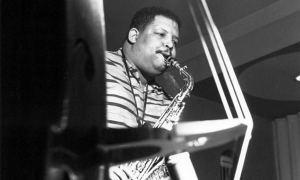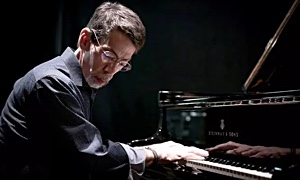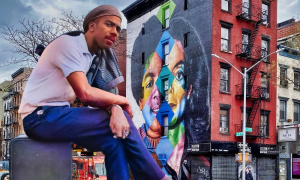Home » Jazz Articles » So You Don't Like Jazz » All About MusicĪ¬My AAJ Experience
All About MusicĪ¬My AAJ Experience

Courtesy Jorge Fakhouri Filho
Music & Taste
Music and food have a lot in common. Variety is the key—without it, even the best prepared food loses its appeal. It is telling that we speak of "musical taste," even though we experience music through our ears.Genres like jazz and classical music weave together themes, patterns, harmonies, and mathematical relationships that usher the mind into a world of stimulating complexity. These genres are like a fine, multi-course meal—each movement and variation unfolding to offer a deeper level of engagement. When written and performed with passion and true inspiration, jazz and classical music have the potential to evoke emotions and move the spirit in ways words rarely can. They nourish the soul by giving sound meaning.
Viewed with a broad perspective, genres such as blues, rock, pop, gospel, bluegrass and country are more focused on the soul and the spirit . These genres are like watermelon, peaches, pizza, fried chicken, ice cream, or a grilled bacon and cheese burger, things that connects to something primal inside us—comforting or exciting melodies that stick in our minds, rhythms that move our bodies, and hooks that trigger our emotions. With their energy and groove, they feed the soul's need for expression, joy, comfort and release, they remind us of the power of melody and rhythm.
It's important to note, that these genres are fluid and have evolved into long form hybrid mediums that draw from jazz and or classical music. The virtuosity of artists such as Buddy Emmons, Chet Atkins, Lenny Breau, Jerry Douglas, or Mark O'Connor is unquestionable, standing shoulder to shoulder with the technical mastery and improvisational brilliance found in the finest jazz and classical musicians.
A true lover of music is like a bee in a vast, blooming garden—a garden filled with endless varieties of sound, texture, and emotion. Depending on mood, appetite, and taste, the musical garden offers the bee the bounty of choice. In the days of record shops, a music lover buzzed around the shop in a state of excited expectation. Viewed this way, music is more than mere entertainment.
In 2018

John McLaughlin
guitarb.1942
Thoughts About All About Jazz @ 30
As we celebrate the 30 year anniversary of All About Jazz, I want to celebrate the artistic freedom it has given me these past 18 years. I don't eat by cuisine, I don't listen by genre—mood decides the flavor. I'm All About Music, and if Michael Ricci weren't already working seven days a week, 365 days a year, I bet he would be open to launching that site. Nonetheless, All About Jazz has been exceptionally accommodating of my eclectic interests.At the same time, I appreciate that jazz fans and aficionados need and want a site dedicated to jazz. So far, my So You Don't Like Jazz columns have revolved around ways to turn people on to jazz. But there is another option. Bonding with others through their music—learning what they enjoy, finding common ground, and perhaps in the process even discovering something new and exciting.
The seeds of my journey to All About Jazz were planted in the 1980s when I relocated to Germany. At that time in Europe it was not uncommon to see classical, rock, and jazz concerts on television in full without commercials. On September 5, 1988 I read with excitement that a

Jimmy Smith
organ, Hammond B31925 - 2005
Then

Barbara Dennerlein
organ, Hammond B3b.1964
For me it was a surreal, spellbinding, transformational experience. That has happened to me on two other occasions, when seeing

Duane Allman
guitar1946 - 1971

Derek Trucks
guitarThe contrast of watching Jimmy Smith perform afterwards was a sobering experience, an hour earlier I would have argued with anyone that he was the greatest jazz organist who every lived—a belief I had held for a couple of decades. Nevertheless, I still recognize he is the most influential Hammond B3 player since the instrument's appearance in 1954—but my musical world shifted.
Little could I have imagined that 19 years later I would interview her for All About Jazz and have my mind blown again by what had happened behind the scenes with Jimmy Smith that day in 1988. An experience that would have destroyed anyone without nerves of steel.
At that point in 1988 they had known each other for ten years. They first met when she was 15 years old and he was a judge for a organ competition in Germany. In our interview she recounted:?"I sat down and played something different, "On the Sunny Side of the Street" and suddenly I noticed someone came from behind me and he took my hair, I had very long hair, much longer than now, and he put it to the side, and then he sat down and he played with me. [laughs] So really, it was great."
For the next ten years they stayed in touch and had a good relationship, he was a friend of the family and a welcomed guest when he came to town—until he saw her as a competitor. She was booked as his opener for a joint appearance on the aforementioned concert show, "JazzClub," a huge deal for the young Dennerlein. As you can read in her interview the dream nearly became a nightmare.
AAJ:?When you were twenty-two [1986] you recorded an outstanding LP with a big band entitled?Tribute to Charlie?[Parker] (Koala, 1987), and less than two years after that you were booked on?Jazz Club?[a popular German television program at the time] with Jimmy Smith. Suddenly the young girl he sat next to on the bench was appearing with him on the same show before a national audience.
You played Dizzy's "Night in Tunisia" with some really hot pedal work, a song Jimmy Smith had also recorded. I'm curious how things went backstage—For example, did he see you playing during the sound check, and did you talk?
BD:?Yeah, I mean I didn't see him, but I'm sure he did. The story is, we were supposed to play together. I remember that very well, it was in Leonberg, fine weather, it was very nice—and he didn't talk to me. And I thought, well, we're playing in two hours, we should talk about what we are going to play. And then I met him in the hallway, and I said, "Hello! We're supposed to play together, should we talk about what we're going to play?" I said that to him and I've never seen someone getting such an angry face. And he was shivering [enraged] and says?"What, you and me playing together, never. They don't pay me enough!"?Really, those were his words, really angry.
So I'm thinking, "Whoops what's going on here," so then I went to the director and I said, "I just talked to Jimmy Smith and he's not going to play with me, maybe you should clear up the situation. I just tried to ask him what we are going to play—whatever," later he [the director] came and said, "Well if he would do it now would you still play with him?" And I said, "Well, you know of course I'm not happy about it, because I know from this reaction that we won't be playing with each other, this will be a playing against each other, a competition," and that's one thing I hate. I really hate to be on stage with people in that situation, trying to one-up each other, everyone tries to play quicker and louder to get the audience's attention, I hate that, I want to make music. But I said, "Okay, I mean, if you want me to do it, I will, but I'm not happy about it." And later he [the director] came and told me he wouldn't do it anyway.
And then, the thing is, originally, Jimmy Smith was there with his quartet, and the show wanted to have me there solo, they thought I should play with Jimmy Smith's musicians. And I said in advance of that concert, I think this isn't a fair situation, because this is the band Jimmy Smith is playing with and they know each other and know the music, and you want me to play on the same show with musicians I don't know. At least I think I should have my drummer who knows my songs.
And in the end I was able to bring my drummer, and this was something which saved me you know, because then Jimmy Smith didn't allow his musicians to talk to me or to play with me. I remember sitting outside with his musicians and they were very, very nice and we were talking and we had fun, and then Jimmy Smith came out in the garden where we were sitting and immediately, you know, they stopped talking.
Despite this, she has always acknowledged his legacy and impact. In the year 2002 she performed this tribute to Jimmy Smith on Swiss television.
How AllAboutJazz came into the picture
Barbara Dennerlein gave a concert in our area around 2006. Right at that time, Derek Trucks had been invited by Dutch radio to do three concerts in the Netherlands. My musical instincts told me they would be an interesting combination. So I took a copy of his album Joyful Noise (Columbia, 2002) with me and gave it to her after the concert. (Later in the Netherlands the same thing in reverse, I gave Derek Trucks a couple of her albums.) We talked and I asked her about why she wasn't touring in America, and she explained the difficulties with entry, visas, work permits, connecting with bookers, the logistical difficulties of the Hammond B3 etc.. I had no clue at that point, so I told her if I could be of help, let me know.We stayed in touch and the first thing I did was to start a YouTube channel for her videos and uploaded the very first Dennerlein video to YouTube. That channel now has three videos that have passed the million views mark.
Next, how to get her some press in America, and that's when I discovered AllAboutJazz. I corresponded with the late great John Kelman. He was a deeply understanding and engaging person, a gifted writer who possessed an encyclopedic knowledge of music, blending insight and wit. With his encouragement my one-off interview evolved into a passionate hobby.
As you can read in her interview, the next year Derek Trucks' manager came through and got her a backstage pass for the

Eric Clapton
guitar and vocalsb.1945
AAJ:?How about Eric Clapton?
BD:?He's a god of blues guitar anyway, when I think about it there's almost no blues guitarist he hasn't played with. It's incredible. I mean, he's played with everyone. He's a fantastic player and I'm so—there was a night when I was invited to the Clapton concert in Munich by Derek's manager, and I wanted to see Derek Trucks with Eric Clapton and all the band, and I had just came back from a tour, and so I was able to go, but my car broke down on the way to the concert! I did everything I could to make it to the concert, but I had to be towed from the Autobahn. In the end I couldn't make it, and I was so sad, it was my chance to finally meet Derek personally and talk, and of course to hear them play live, and live is always a special experience, much more impressive than seeing someone play on a DVD or such.
Eric Clapton & Chuck Leavell
My second interview was with another of my favorite musicians,
Chuck Leavell
keyboardsb.1952
(Years later, I interviewed Clapton's go-to bassist

Nathan East
bassAAJ:?How about the '90s?
CL:?The '90s would be "Old Love" for sure.
AAJ:?I was curious about Eric Clapton's reaction after the taping. He seemed pretty surprised.
CL:?Well, I think I was very much like a coiled spring on that show. The fact is that I had worked with Eric for a while, but basically as a second keyboardist behind Greg Phillinganes, for whom I have immense respect, and who is a dear friend. Greg resigned during our tour with

George Harrison
guitar1943 - 2001
He would go on to become the long-time keyboardist and tour musical director of the Rolling Stones.
Eric Clapton & Derek Trucks
Derek Trucks was the third musician I interviewed for AllAboutJazz, that was in early 2009 not long after his world tour with Eric Clapton. The above clip of "Why Does Love Got to be so Sad" is one of my personal favorites on YouTube. In our interview I asked him about it:AAJ:?I was really moved by the way you and Eric communicated when you started doing "Why Does Love Got to be so Sad" as the tour progressed.
DT:?Yeah, yeah, those were some of my favorite moments of the tour.
AAJ:?You could just see it, in those moments there was no age difference, no question of fame or icon status, you guys were just so intimate and in the moment. Even as someone in the audience, you could just feel the spirits talking. I'm curious what that's like for the musician, do you get the sense your talking soul to soul in those moments, and does something like that forge a special bond between you?
DT:?I think so, definitely, when you're communicating on that level it's total trust. And all of your senses are full on in those moments, you're in a heightened sense of awareness and you're being really sensitive to the other player. You're trying to do your own thing and head down a certain path while also reacting. There were two or three nights when we played that and I felt it really happened. I felt good [laughing], it felt great!
Louie Shelton
Interviewing great session musicians like
Louie Shelton
guitarb.1941

Elvis Presley
vocals1935 - 1977

John Lennon
guitar and vocals1940 - 1980

Michael Jackson
vocals1958 - 2009

Stevie Wonder
vocalsb.1950
AAJ: I think a lot of jazz fans would be surprised that Wilton Felder from the Jazz Crusaders played bass, along with [bassists]?

Harvey Brooks
bass, electricb.1944
LS: Wilton played on?"Diamond Girl," but I'd have to look at the album credits. You know, Motown was really hard on bass players. They didn't write out stuff for us guitar players, they wanted us to come up with stuff, but they wrote out the bass parts. He is a great saxophonist, but somehow he got a hold of a Fender bass and learned how to play it. Wilton is such a good reader and it didn't matter what you put in front of him.
From talking to some of the arrangers, like Gene Page, who was a big arranger on all the Motown stuff, he could tell if a player was a bit hesitant about something coming up a few bars down the page. He could almost sense that they were getting ready for it and were afraid of it. But he said with Wilton it was so comfortable and that came through on the record, it was so flowing and so in the pocket. He became the favorite player on that stuff. And?Joe Sample?was a favorite keyboard player, and he was from the Jazz Crusaders as well.
Susan Tedeschi & Oteil Burbridge
"Midnight in Harlem" has become a timeless classic for a lot of people. Stellar performances by
Oteil Burbridge
bassb.1967

Susan Tedeschi
vocalsAAJ: In terms of music, many people feel the human voice holds a special place. You know, there are billions of voices, and like snowflakes, no two are alike. Somehow, after just three notes, you know if it's

Ray Charles
piano and vocals1930 - 2004

Louis Armstrong
trumpet and vocals1901 - 1971

Johnny Cash
guitar and vocalsST: I really think it has a lot to do with the actual tone of the voice, and like you said, if you can recognize somebody after a few notes it really has something to do with their own special character and blend of all their influences. For example, there was a period when you could listen to Ray Charles and he sounded like Charles Brown. He was singing and copying other people. Later on he developed his own style that was influenced by all these people, but he became the artist we know as Ray Charles.
I think that's very true for me and most singers, you have so many influences. For example, I became friends with Norah Jones back in 2000 when we were doing a show—this was before she had become famous. She was talking about all her influences, people like

Billie Holiday
vocals1915 - 1959

Nina Simone
piano and vocals1933 - 2003
That's the thing: you have your influences but you need to have your own style. So many people have influenced me, people like Aretha (Franklin),

Etta James
vocals1938 - 2012

Donny Hathaway
vocals1945 - 1979
It's interesting when you think about the sound. With Derek, even though he's a guitarist, I think of him as a singer. It's the same, he has a voice and if you hear a couple of notes, you know it's him.
Jaimoe

Jaimoe
drumsb.1944

Allman Brothers Band
band / ensemble / orchestraJaimoe: He's a great musician and a great entertainer, and like you said, he's got the whole package: he plays the guitar, he sings, he writes songs, and he's a businessman. He was a computer specialist for 25 years, and worked for a big computer company troubleshooting, and they laid him off. So he began concentrating on his music, and played what he wanted to. He ended up never going back. When they tried to call him back in, he didn't do it, and instead he became a fulltime musician.
Jerry Jemmott

Jerry Jemmott
bass, electricb.1946

Duane Allman
guitar1946 - 1971

Herbie Mann
flute1930 - 2003

Mike Bloomfield
guitar1943 - 1981

Johnny Winter
guitar, electric1944 - 2014
AAJ: Were the strings on "The Thrill is Gone" live with you guys?
JJ: No, that was?Herbie Lovelle's idea, and Bert de Coteaux did the arrangement after the fact.?Bert is great.
AAJ: Oh man, those cellos are wild.
JJ: Yeah, what they would do in those days is pick up the rhythm parts and duplicate and amplify them. Then they would take the rhythm section down in the mix and you would hear the strings.
AAJ: It's so cool, the way he did it, it's like a spontaneous dialog between you and the cellos.
JJ: Bert was phenomenal, he was able to pick up on that, and on the lines that Hugh McCracken was playing. That's their technique, it's called sweetening. Sometimes it's accentuating or it can be a call and response.
Wayne Krantz & Keith Carlock
Donald Fagen performing "Weather In My Head" from the album Sunken Condos (Reprise, 2012) live on David Letterman. On lead guitar is the one-of-a-kind
Wayne Krantz
guitar, electric
Keith Carlock
drumsJohn Scofield
John Scofield revealing one of his many sides, performing "Alone Together," composed by Arthur Schwartz, with Chris Minh Doky. In 2011 I had the opportunity to interview him about blues & rock, just a couple of days after he sat in with the Allman Brothers Band at the Beacon.AAJ:?How about you as a child of the '50s, were you aware of the early rock and rollers prior to the British invasion?
JS:?I had an older sister, so I remember the dawn of rock and roll. I remember my sister had those little 45 records, and I also remember when Elvis was on TV for the first time. I was really little and still living in Dayton, Ohio, before we moved East. So I was about four or five years old, it must have been on the old?Steve Allen Show?[July, 1956.]
And I remember my mother said before this, "Your aunt in Jackson, Mississippi heard Elvis sing." I had family down there, but as an adult I remember thinking that can't be true, because she said he sang gospel from the back of a flatbed truck. But later on I found out it was true. But experiencing rock and roll through my sister was a great thing, through her records I got to peep into the world of a teenager even though I was really little.
And you know that early rock and roll had so much of the New Orleans feel, to me that feeling is the greatest. And actually it is very akin to jazz.
AAJ:?This makes me think of something, do you know Louie Shelton? He actually met and saw Elvis Presley when he performed at his high school.
JS:?This is amazing, I know you did an?article?with him, and yes he came to one of my gigs in Australia and we met. We talked and he told me about his incredible life story—and that Elvis story is just unbelievable.
And I also know another guy who grew up down there and drives for this car service up here, and it was the same story, he knew Elvis and heard him at dances down there.
John McLaughlin
John McLaughlin's gem "Time Remembered," with Yan Maresz on acoustic bass, and the Aighetta Quartet providing classical guitar accompaniment. Perhaps his most romantic record and a testament to his artistic freedom and skill. I've had the great privilege of interviewing him three times. I've also interviewed each of the members of his band, The 4th Dimension.AAJ:?It's an incredible thing. You know John I'm sure you remember when that first synthesizer album came out, it was called?Switched On Bach.
JM:?Oh yeah, I remember it very well!
AAJ:?That was a really big thing, and it was interesting because young people were suddenly able to appreciate Bach, and they didn't do anything to it except play it through a synthesizer. I can remember thinking to myself when I heard it, that Bach seems to have tapped into something that must be like a universal law, like mathematics. I don't think mathematicians created math, but they were able to identify the laws of mathematics. There's an elegance to it, and it works. Somehow I wonder, is music simply inherent in the universe, and someone like Bach is particularly adept at drawing upon that universal elegance that is so timeless?
JM:?Oh absolutely, and I would have to include Mozart. I absolutely agree with you. I know for a fact that infinite music and infinite ideas, whether they are mathematical, or whether they are art, they exist continuously, and they've existed since the birth of the universe.
I think mathematicians, scientists, astronomers, astrophysicists, artists, painters, and musicians need to profoundly love what we do. Then in a way, the love makes a connection to that realm where all these idea have always existed and always will exist. I know it sounds like science fiction, but I'm absolutely convinced of this. When I'm truly inspired, then I get access to this realm. How logical is inspiration, how can you classify inspiration in a logical manner? It's impossible, there's no logic to it, it just is what it is.
We all experience inspiration in our own way, and we become immediately aware of the new state we're in, when we are in a state of inspiration. It's beyond the normal state of the mind, we're in another state of mind. This other state of consciousness gives us access to places that are inside of us—everything is inside of us in consciousness, I'm convinced of this.
You're talking to an old hippie Alan. I did LSD quite a lot in the '60s, until such time as I realized that everything was in me, and what was important was to learn how to access it, and the only way I can access it, is that I stop taking LSD. Then I started practicing yoga, and then meditation.
Eliot Lewis
After Eliot Lewis finished high school his demos caught the attention of a highly successful producer who enlisted him for studio work and took him under his wing. He played on albums by artists such as?James Brown,?Joe Cocker, and Tina Turner, and also gained valuable production experience.From there he worked for several years as a contract songwriter for Sony and later Warner Brothers. One of his songwriting partners was a founding member of the?" data-original-title="" title="">Average White Band, and when they reformed he was asked to join. For thirteen years he was out front singing, playing bass, keyboards, guitar, and touring with legendary bands like

Earth, Wind & Fire
band / ensemble / orchestra
James Brown
vocals1933 - 2006
Zayn Mohammed
Appearing on the main stage at the Latitude Music Festival was Zayn Mohammed's prize for winning the 2016 season of the UK SkyArts TV series Guitar Star. He was welcomed to the stage by legendary rock producerTony Visconti
recorder
David Bowie
vocals1947 - 2016

George Benson
guitarb.1943
Carl M?rner Ringstr?m
Sweden's?Carl M?rner Ringstr?m got his first electric guitar at the age of seven, and although his father is a classical guitarist, the son was determined to master the instrument on his own. He spent the next four years in his room with the door closed learning to tune and play guitar by listening to Eddie van Halen—a decision which gave him his unique approach to jazz. He discovered jazz when he began formal musical training in the Swedish school system, but continued to play in several rock and metal bands. His audio interview is available here.Mike Seal
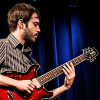
Mike Seal
guitarMS: Oh no, I continue to play today, and I took formal lessons through high school. My brother and I continued to study with a lady where we grew up, her name was Nancy Hackman, and she was a conservatory trained classical pianist. So she had a really solid foundation to teach from. Her arthritis was so bad in her old age that she didn't play anymore, but we knew that she was very knowledgeable about what she was doing, so we played a lot of the sonatinas and sonatas, and piano works that you would be presented with as a young student in that vein.
AAJ: How about guitar, was it formal instruction there too, or were you and your brother just picking that up?
MS: It was formal in that we were reading the Mel Bay method of guitar. It was a little bit interesting because we took our guitar lessons from our piano teacher, and she did not play guitar. That didn't really bother us—we were so young. Because what she was really skilled at was reading knowledge, and getting us to sight read. She had perfects ears and she could hear when we made a mistake, but she couldn't convey any technique to us. So we weren't learning how to hold the instrument, or properly hit the string, how to hold our hand, or the angle of how the neck sits. So we were basically playing classical music on steel string bluegrass guitars. But we learned to read at a fairly high level at a young age because she was such a profound teacher in that way.
Ronny Jordan
This interview was conducted a year before
Ronny Jordan
guitar1962 - 2014
AAJ:?What has always impressed me with your music is that, like Miles Davis, you are able to paint a mood with music.
RJ:?Miles was always a major influence in terms of that, and the concept of "less is more." So I'm not a singer, and doing instrumental music I am trying to communicate in clear precise terms, so people can understand exactly where I'm coming from. So singing will always be the ultimate, so when Celine Dion sings, "My heart will go on," or McCartney's "Yesterday" or "Hey Jude" or John Lennon's "Imagine"—you understand every line.
So I'm trying to make the melody as strong as possible and memorable. Someone wrote and said he couldn't believe?The Antidote?is over 20 years old, because it still sounds fresh today. A fan told me the other day, "Ronny your music is timeless." I take great pride in that, and I like to think of my music as timeless.
Jimmy Herring
I have done three extended interviews with
Jimmy Herring
guitarb.1962
Rather than quote him, let me share what others have said to me about him.
John Scofield:?I think I have a lot in common with?Jimmy Herring?and?Derek Trucks, and I'm sure they see it that way too. First of all, those guys are really serious about blowing, and like jazz players they are serious about getting something happening in their solos, even though they aren't straight ahead jazz beboppers. So in that way, we do have a lot in common.
I'll share what John McLaughlin said to me about him in an interview I did with both of them for his "Farewell to America Tour"—due to the length this was partially done in narrative form:
I hardly got a chance to ask John McLaughlin about Jimmy Herring, but just as his wife told him his next interview was waiting I asked him about Jimmy's version of his song "Hope." Impassioned he responded: "Did you hear the solo he played on that? I heard that solo and I said, holy shit! (Laughing) Why couldn't I play that! I called him up right away, and I said you just nailed it Jimmy, you nailed it. He played that song like it's his, he made it his. It's unbelievable, and what he did so endeared him to me, I really felt like he was family. He'd taken that piece of music that I wrote all those years ago and he turned it into something magnificent and then he soloed on it—I mean, like to die for, amazing."
I mentioned it was a shame George Harrrison didn't have a chance to hear Jimmy's version of his song, "Within You Without You": "I wrote to him last week and I asked are you going to play "Within You Without You," and he said, oh man, you know I haven't done it in a long time. (Laughing) Maybe I've got to brush it up. But you know, it's amazing, amazing. A little bit like Jeff (Beck) doing "A Day in the Life." And Jimmy's got that thing, and that tune, he does the perfect George arrangement—you know with the strings (sings) da da di da, da da di da. I'm really excited that we're going to be playing together."
So that was a walk down my AllAboutJazz memory lane. It was impossible to include all the talented musicians I've interviewed along with clips:

Matthias Bublath
organ, Hammond B3
Tim Collins
vibraphoneb.1977

Jim Hart
vibraphoneScott Sharrard
guitar, electric
Jeff Sipe
drumsb.1959

Jon Batiste
pianob.1986

Nathan East
bass
Gary Husband
drumsb.1960

Etienne Mbappe
bass
Alex Machacek
guitar, electric
Oteil Burbridge
bassb.1967

Ranjit Barot
drumsMy experience with AllAboutJazz has been truly rewarding, deepening my appreciation for music and musicians, and fostering tremendous respect for those with the nerve, talent, and determination to pursue their dreams. Before this, I never fully understood what it means to walk away from security and face daunting odds of success. If you're an AllAboutJazz reader, I encourage you to reach out to emerging musicians for an interview or review—you won't regret it.
Tags
So You Don't Like Jazz
Alan Bryson
john mclaughlin
Jimmy Smith
Barbara Dennerlein
Duane Allman
Derek Trucks
Eric Clapton
Chuck Leavell
Nathan East
Greg Phillinganes
George Harrison
Louie Shelton
Elvis
John Lennon
Michael Jackson
Stevie Wonder
Marvin Gaye
Harvey Brooks
Oteil Burbridge
Susan Tedeschi
jaimoe
Allman Brothers Band
Jerry Jemmott
Herbie Mann
Mike Bloomfield
Johnny Winter
Wayne Krantz
Keith Carlock
Anne Drummond
Average White Band
Earth, Wind & Fire
James Brown
Tony Visconti
David Bowie
george benson
Mike Seal
Ronny Jordan
Jimmy Herring
Matthias Bublath
Tim Collins
Jim Hart
Scott Sharrard
Matt Slocum
Jeff Sipe
Jon Batiste
Gary Husband
Etienne Mbappe
Alex Machacek
Ranjit Barot
Brandon Neidermeier
Comments
PREVIOUS / NEXT
Support All About Jazz
 All About Jazz has been a pillar of jazz since 1995, championing it as an art form and, more importantly, supporting the musicians who make it. Our enduring commitment has made "AAJ" one of the most culturally important websites of its kind, read by hundreds of thousands of fans, musicians and industry figures every month.
All About Jazz has been a pillar of jazz since 1995, championing it as an art form and, more importantly, supporting the musicians who make it. Our enduring commitment has made "AAJ" one of the most culturally important websites of its kind, read by hundreds of thousands of fans, musicians and industry figures every month.



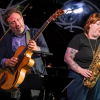



 Buy Now
Buy Now





